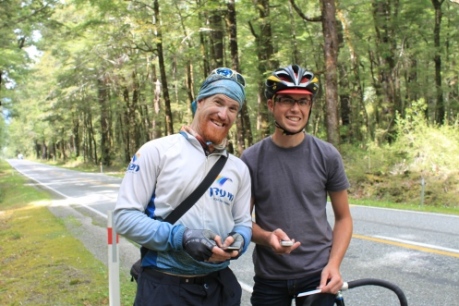You never know who you’ll meet
March 18, 2011
This is my friend Roei. I met him during my South Island ride. He’s near the end of a 64,000km round-the-world adventure.
He’s seen some amazing things and met some very interesting people along the way, to be expected when travelling through six continents and 39 countries on a bicycle.
You can follow his journey on his blog and read my story in The Aucklander here.
Roei is riding the length of New Zealand with his friend Etamar. They arrived in Auckland last week and stayed a couple of nights at mine before making their way up to Cape Reinga.
To talk to them about their home – Israel – is to have an eye-opening insight into how complex Middle Eastern tensions are. These two young men show a wisdom and understanding (although they say they’re no experts on the politics) beyond their age. Speaking to them made me realise how lucky we are to live in the relative peace of New Zealand. I think this is easy to take for granted.
Roei and Etamar seem resigned (perhaps realistic is a better word?) but certainly not cynical that there will be a World War III in their lifetimes and that their country will be involved. Although quite possible, the idea still scares me. Roei recalled an interesting saying that I’ve never heard before:
“We don’t know what weapons will be used in World War III, but we do know World War IV will be fought with sticks.”
Lake Taupo Cycle Challenge
November 28, 2010
I finished yesterday’s race in 5:37.15 – that’s 160km of non-stop pedalling at an average speed of just under 28kph. Not bad I say.
Surely you could coast down the hills you might ask? Nope, I did the race on a track bike, that means no freewheel and no coasting.
I used the race as a means to fundraise for the Kiwi charity Medicine Mondiale. All up I managed to raise $1180, although there might be a bit more trickling through in the wake of the race. Ray Avery’s Medicine Mondiale does a fantastic job at developing high-quality solutions to the medical problems faced by those less fortunate than ourselves. The charity is dedicated to creating a more equitable world and is about using science to solve specific problems, not simply sending poor countries our secondhand leftovers. If you’d like to make a donation please visit Medicine Mondiale’s site.
The race was hard but my training paid off. I’m very happy with my time and how well I did on the hills. There was seriously no contest as roadies would gear down, spin like hell, and go nowhere, as I powered steadily up each and every climb. They might then pass me on the next long downhill, only to succumb to the next climb. Consistency was really the key. It seemed like many riders started out quick but ended up falling back as the race progressed and fatigue set in.
To be really honest I can’t remember that much. My focus was steadily on what was in front of me and pushing myself to catch the group up ahead. I basically followed this pattern of jumping from group to group as I pedalled on. The ups and downs all blend into one as everything and nothing goes through your head. People call this ‘”getting into the zone”, but it’s hard to explain this to someone who hasn’t experienced sporting focus first hand.
Hatepe Hill was one to remember, though. In the lead up to the race I’ve heard and read much about this infamous hill. What they say is true, this hill is steep – very, very steep. It climbs 150m in around 2km, and at the 132km mark, it’s bound to take its toll. As I approached the bottom of Hatepe I saw swarms of riders slowly making their way up it. A few people passed me, only to have me pass them moments later as the hill proper kicked in. I climbed Hatepe at a steady pace of just under 10kph. This was fast enough to see me pass many people the whole way up. It’s a bitch of a hill, and one that soon sorts the men from the boys. Many dismounted to walk instead of ride, it is that steep.
Here are some photos that my trusty support ‘crew’ (there was no crew as such, only one Louisa) snapped during the race. Fingers crossed one of the professional photographers snapped me in action, but with thousands of participants the chances of this is unlikely.
